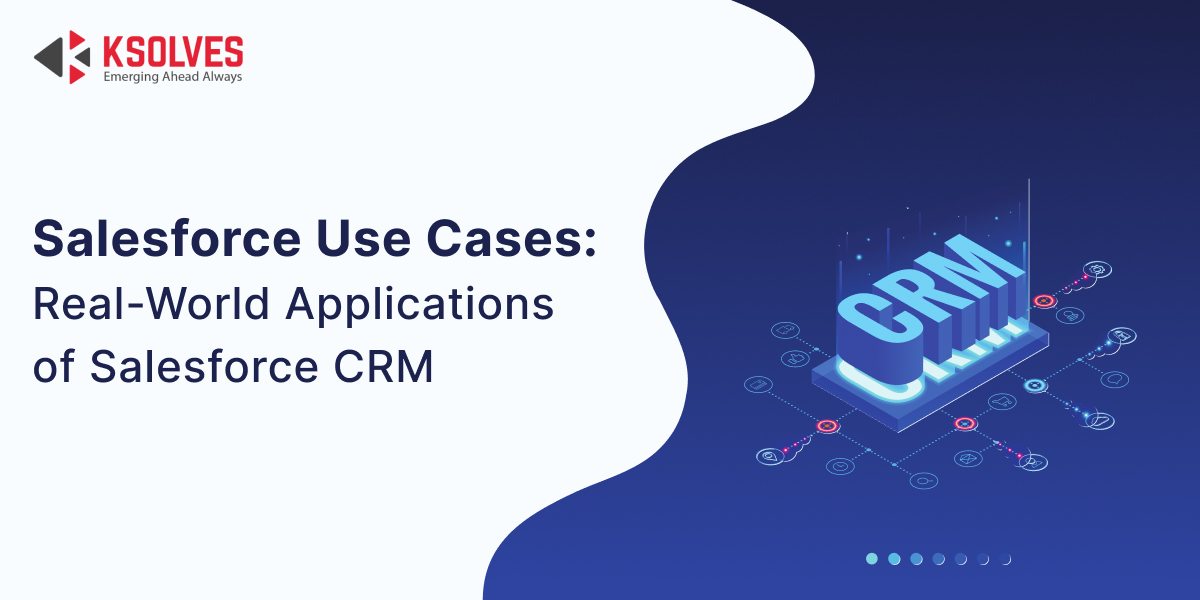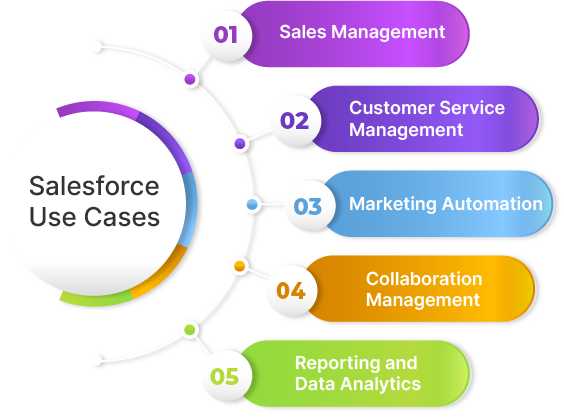Salesforce Use Cases: Driving Revenue Growth Through CRM
Salesforce
5 MIN READ
June 18, 2024
![]()

Salesforce has been ruling the market of customer relationship management (CRM) software for the past two decades. It is ranked as the world’s #1 CRM for the 9th time in a row. In the fiscal year 2023, Salesforce has reached 31 billion U.S. dollars of revenue, according to Statista. This number represents the worldwide adoption of this CRM platform.
From acquiring and nurturing leads to maintaining long-term relationships, Salesforce serves as a robust platform to cater to every stage of a customer lifecycle. With Salesforce industry solutions, companies across the globe have marked a significant increase in revenue.
Whether you are a small firm or have an established business, Salesforce caters to the needs of every business size. It assists you in effortlessly managing customer service, sales, marketing, and many other aspects of a business. In this article, we aim to introduce you to the Salesforce use cases and how businesses leverage this platform to drive customer engagement and boost sales.
Understanding Salesforce
Salesforce is not a single tool; instead, it is a suite of tools. It is an integrated CRM platform that brings multiple tools under one roof. A complete portfolio of Salesforce products and services is commonly referred to as Customer 360.
This CRM connects sales, commerce, service, IT, and data teams and centralizes customer data, ensuring a single source of truth. It also has its artificial intelligence called Einstein, which automates several tasks across different teams. A trio of CRM, AI, and data helps businesses become smarter and more efficient in managing and retaining their customers.
The benefits of the Salesforce platform are multitudinous – centralized customer data, streamlined sales processes, automation, increased lead qualification, enhanced customer satisfaction and retention rates, improved collaboration, and increased revenue. Moreover, we will also let you know How Companies use Salesforce for their growth?
Salesforce Use Cases – How Do Businesses Use Salesforce?
Salesforce offers different products, and each product has unique features and different use cases. Let us now discuss how businesses use Salesforce solutions for different industries.
1. Sales Management
For sales management, Salesforce Sales Cloud comes in handy. It is a cloud-based product that serves as an integrated platform supporting sales, marketing, and customer support for B2B and B2C businesses. It comes with tools and technologies, enabling businesses to manage their sales processes and customer interactions, track leads, automate tasks, and gain insights into sales performance.
Salesforce Sales Cloud Use Cases
Here is how Sales Cloud helps companies:
- Reach out to prospects via digital channels, including messaging apps, social media platforms, email, etc.
- Capture, track, and manage leads effectively.
- Facilitate lead scoring, routing, and nurturing so that the sales team focuses on the most promising opportunities.
- Manage sales opportunities, which include tracking deals, forecasting revenue, and collaborating with team members.
- Visualize sales pipelines, track deals’ progress, uncover potential bottlenecks, and prioritize activities.
- Automate repetitive tasks, such as sending emails, follow-up reminders, etc., to elevate efficiency.
All these features are used by businesses to streamline their sales processes, boost productivity, drive engagement, and increase revenue.
However, it is important to note that every business domain uses Sales Cloud differently. Let us understand the Sales Cloud use cases using real-world Salesforce examples.
Real-World Example or Use Case of Salesforce Sales Cloud: Tech Solutions Inc.
Tech Solutions Inc. is a dynamic, fastest-growing company specializing in software development, cloud computing, cybersecurity, and IT consulting services. It caters to a diverse clientele spanning across various industries.
Problems
- Inadequate lead management, resulting in overlooked opportunities.
- Limited insights into sales pipelines and performance metrics.
- Challenges in tracking customer interactions and managing customer support requests.
- Inconsistent sales processes across different geographic areas
- Limited scalability hinders growth potential.
Impact of Implementing Salesforce Sales Cloud
To address the above challenges, Tech Solutions Inc. has implemented Salesforce Sales Cloud. With Sales Cloud, the company was able to:
- Capture leads from various sources, such as website forms, social media, email campaigns, etc.
- The route leads to appropriate sales representatives based on automated lead assignment rules.
- With Salesforce Cloud’s customizable dashboards and reports, gain deeper insights into sales pipelines and performance metrics.
- Track opportunities, uncover bottlenecks, and analyze sales trends.
- Record all customer interactions, including emails, calls, and support requests, in a unified platform to streamline the management of customer interactions.
- Standardize and automate sales processes with intelligent tools.
- Scale Salesforce instances to accommodate more user data without any performance issues.
If you want to implement Salesforce into your business operations, consider a Salesforce consulting partner. Ksolves is a Salesforce Crest Partner with 12+ years of experience offering Salesforce Implementation Services, from consulting to customization and integration. Certified Salesforce professionals plan, design, and deliver innovative Salesforce solutions that cater to your business needs.
2. Customer Service Management
Customer service is at the heart of any business, as it drives more engagement, builds trustworthy relationships, and fosters loyalty. Salesforce Service Cloud enables businesses to provide exceptional, personalized, and AI-powered service and customer support.
Whether it is an email, phone, messaging apps, text, Experience Cloud sites, or any other medium, Service Cloud ensures that customer service needs are met. Its primary objective is to foster one-to-one relationships with each customer across diverse communication channels.
In addition, Salesforce Service Cloud automatically sends customer requests to the best and most suitable service agent based on various factors, such as availability and expertise. It then recommends actions for service agents based on customer data stored in the CRM integrated with the Einstein 1 platform.
Salesforce Service Cloud Use Cases
Here is how Service Cloud helps businesses streamline customer service tasks:
- Capture customer requests and queries and assign them to a suitable support agent.
- Automate the management of customer support cases, from creation to resolution.
- Provide access to multiple communication channels to engage with customers.
- Include a knowledge base to enable companies to store articles, FAQs, how-to guides, and troubleshooting guides related to their products/services.
- Provide the flexibility to create customer self-service portals.
- Streamline field service management with Field Service Lightning.
- Gain insights into customer service performance, agent productivity, customer satisfaction levels, etc., with in-built analytics and reporting tools.
Read more: Explore Salesforce Service Cloud features
Let’s move to the next section and know some real-world Salesforce Success Stories with its technologies i.e., Salesforce Sales Cloud, Salesforce Service Cloud, Marketing Cloud, and others.
Real-World Salesforce Service Cloud Use Case: ShopVista Online Retail Store
ShopVista is an online retail store offering a wide range of products, from electronics to fashion apparel. With its large customer base, the company receives countless customer inquiries, support, and complaints. Its existing CRM was not able to handle such large volumes of customer requests. Hence, the company decided to implement Salesforce Service Cloud.
Problems
- Delays and inefficiencies in resolving customer issues.
- Lack of visibility into customer interactions and service history due to disparate systems.
- Difficulty in delivering consistent customer service across several touch points.
Impact of Implementing Salesforce Service Cloud
Let us have a look at how ShopVista has addressed the above challenges by implementing Salesforce Service Cloud.
- Automated case management resulted in faster and more efficient resolution of customer issues.
- Integrated an existing CRM with Service Cloud and gained 360-degree visibility into customer interaction, service history, and customer preferences.
- The omnichannel support enabled the company to engage with customers across several touch points from a single interface.
3. Marketing Automation
Another widely popular Salesforce user case is marketing automation. Salesforce Marketing Cloud is a handy tool for marketers, as it assists them in automating marketing activities across diverse digital channels. Plus, marketers can streamline marketing campaigns, track campaign performance, engage prospects, nurture leads, and drive conversions. The combination of AI and trusted customer data enables marketers to deliver personalized experiences across all channels.
According to one Salesforce report, businesses implementing Salesforce Marketing Cloud have experienced an increase in customer engagement of 31%.
Salesforce Marketing Cloud Customer Success Stories or Use Cases
Here is how Marketing Cloud helps marketers:
- Create, send, and track personalized email campaigns at scale.
- Automate email workflows, such as welcome emails, cart abandonment emails, etc., to nurture leads.
- Use a drag-and-drop email builder to create personalized email campaigns.
- Segment email lists based on customers’ preferences, behaviors, and demographics.
- Create, automate, and analyze customer journeys across different touchpoints.
- Manage social media presence and engage with customers on different platforms.
- Create and send targeted SMS, MMS, or push notifications.
- Create and manage targeted advertising campaigns across different advertising channels, such as Google Ads, Facebook Ads, LinkedIn Ads, etc.
Read More: Discover Salesforce Marketing Cloud capabilities
Real-World Salesforce Marketing Cloud Use Case: Sunshine Travels
Sunshine Travels is a newly established travel agency providing a wide range of travel services, such as vacation packages, hotel accommodations, flight tickets, car rentals, etc. As a new company, it faced challenges in acquiring customers and gaining their trust. To enhance its marketing efforts, the company implemented Salesforce Marketing Cloud.
Problems
- Challenges in acquiring customers due to fierce competition.
- Inadequate public awareness.
- Limited budget to run promotional personalized campaigns.
Impact of Implementing Salesforce Marketing Cloud
Sunshine Travels implemented Salesforce Marketing Cloud and experienced significant improvements in brand awareness, customer acquisition and loyalty, and revenue growth.
- Created customer segments based on demographics, behaviors, and interests.
- Developed targeted marketing campaigns tailored to each customer segment.
- Personalized marketing campaigns and messages helped improve customer engagement, conversion rates, and customer satisfaction.
- With omnichannel marketing, the company was able to reach out to customers across different channels.
- Gained valuable insights into campaign performance by analyzing metrics, such as open rates, click-through rates, etc.
4. Collaboration Management
Seamless collaboration among employees, partners, clients, and customers is essential for any business. Salesforce Experience Cloud, formerly known as Community Cloud, is a platform that allows organizations to create online communities where their customers, partners, stakeholders, and employees can collaborate with each other.
Salesforce Experience Cloud Use Cases
Here is how Experience Cloud assists organizations in improving collaboration:
- Create online communities, allowing customers to share their experiences and feedback with others.
- Create customer self-service portals to enable them to find answers to queries on their own, access knowledge-base articles, and troubleshoot issues with how-to guides.
- Create partner portals where businesses can collaborate with channel partners, distributors, and resellers.
- Gather customer feedback and insights through online surveys.
Real-World Salesforce Experience Cloud Use Case: Bright Future University
Bright Future University is an educational institution offering a plethora of professional courses and academic programs online. With diverse courses and programs and a large student population, student collaboration and engagement among themselves and with faculty were challenging. As a result, the institution implemented Salesforce Experience Cloud to create a unified digital experience for students, staff, and faculty.
Problems
- Fragmented communication channels made it difficult for students to connect with peers, faculty, and administrators.
- Limited student engagement beyond courses and academic programs.
- Lack of personalized support to students.
Impact of Implementing Salesforce Experience Cloud
After implementing Salesforce Experience Cloud, the institution witnessed improved collaboration, student satisfaction, and retention rates.
- Created an online community where students, faculty, administrators, and other staff can collaborate anytime.
- Initiated interactive forums, social groups, and virtual events to encourage students to participate in campus activities beyond the classroom.
- Provided personalized student support through knowledge-based articles and other self-service portals.
5. Reporting and Analytics
The ubiquitous Salesforce use case is reporting and data analytics. With advanced analytics, comprehensive reports, and customizable dashboards, businesses can visualize various metrics, such as sales performance, customer satisfaction, marketing ROI, etc. In addition, dashboards enable them to easily find room for improvement in business processes.
Analytics features enable predictive modeling, allowing organizations to anticipate future market trends and potential risks.
Conclusion
Hope, you get a clear idea and understanding of how companies use Salesforce and some real-world use cases or success stories of Salesforce with its multiple technologies including Sales Cloud, Service Cloud, Marketing Cloud, and others.
With its wide range of tools and capabilities, Salesforce has the potential to address the challenges of diverse industry verticals. Whether it is automating sales management, optimizing customer service, or facilitating collaboration and customer engagement, Salesforce provides businesses with tools to thrive and excel.
By leveraging Salesforce, organizations can deliver exceptional personalized experiences, resulting in improved customer acquisition & engagement, conversion rates, and customer satisfaction & retention rates. It assists them in forging strong, long-term relationships with their clientele, driving unprecedented growth.
![]()





AUTHOR
Salesforce
Md. Asad Khan, an expert Technical Project Manager at Ksolves, who is a certified Salesforce architect at Ksolves, brings 7+ years of experience. He specializes in FSL, B2B, Service & Sales Cloud, and Non-profit cloud, excelling in APEX, Aura Component Framework, Lightning Components, Triggers, Visualforce, and creating insightful dashboards and reports.
Share with